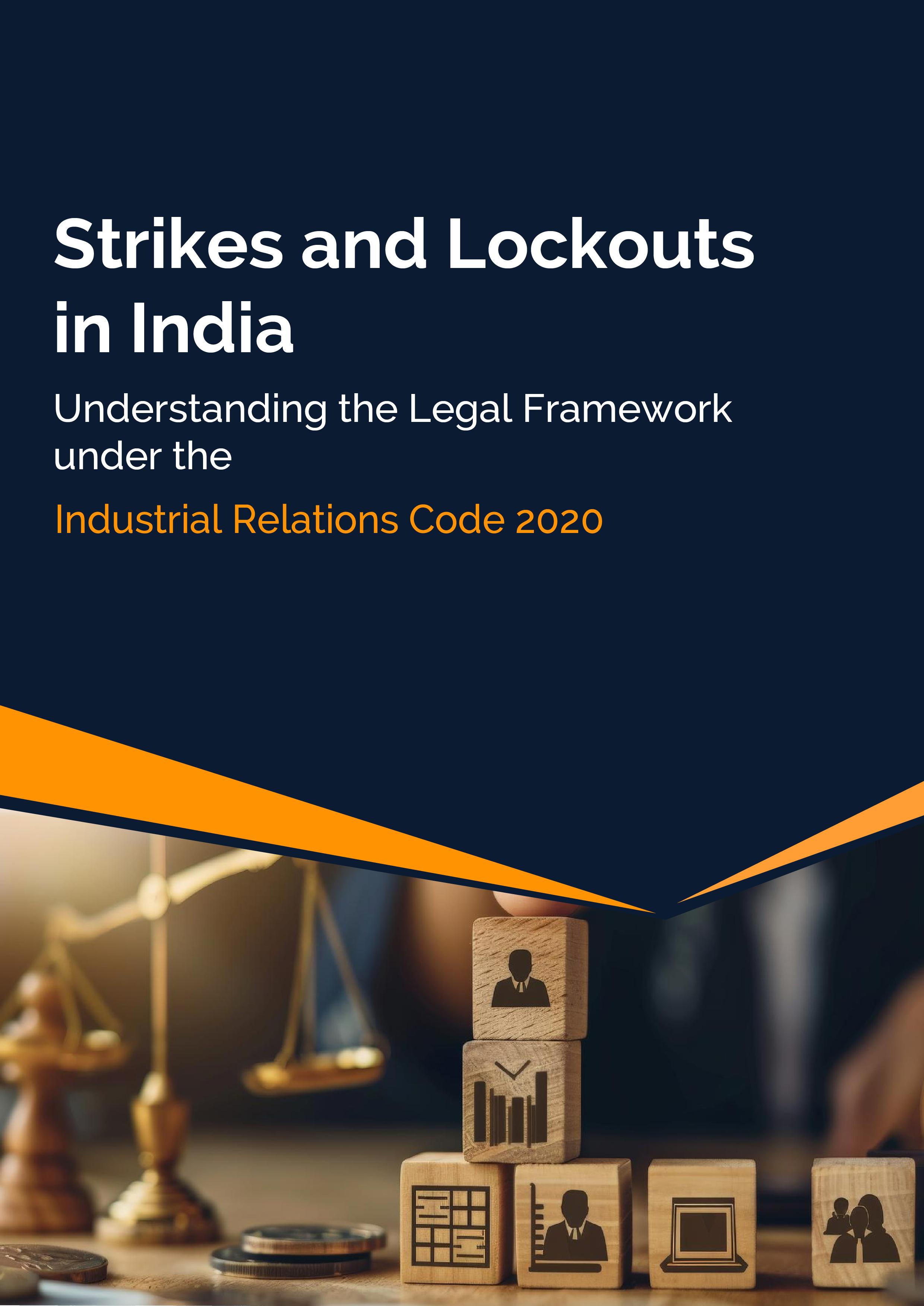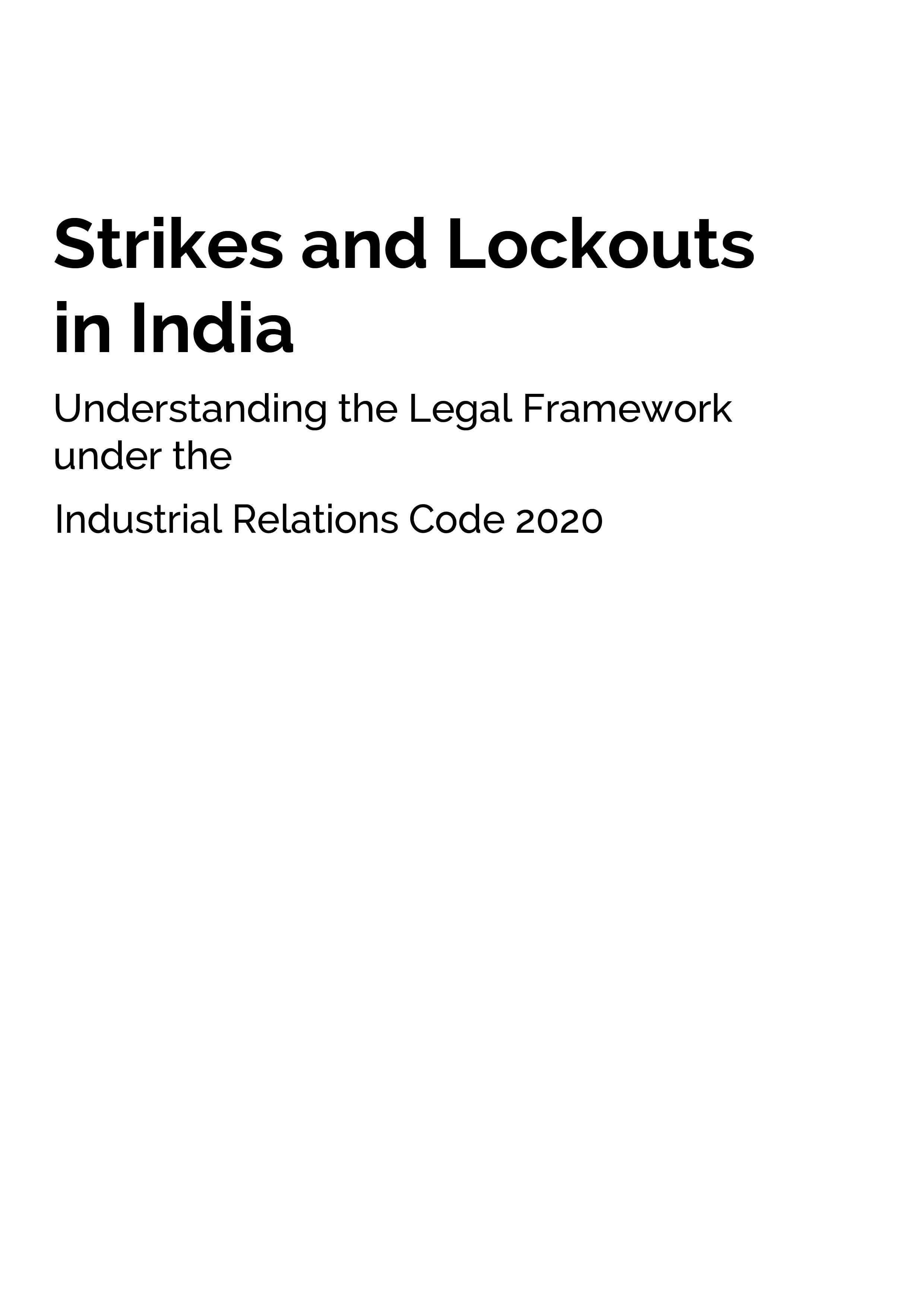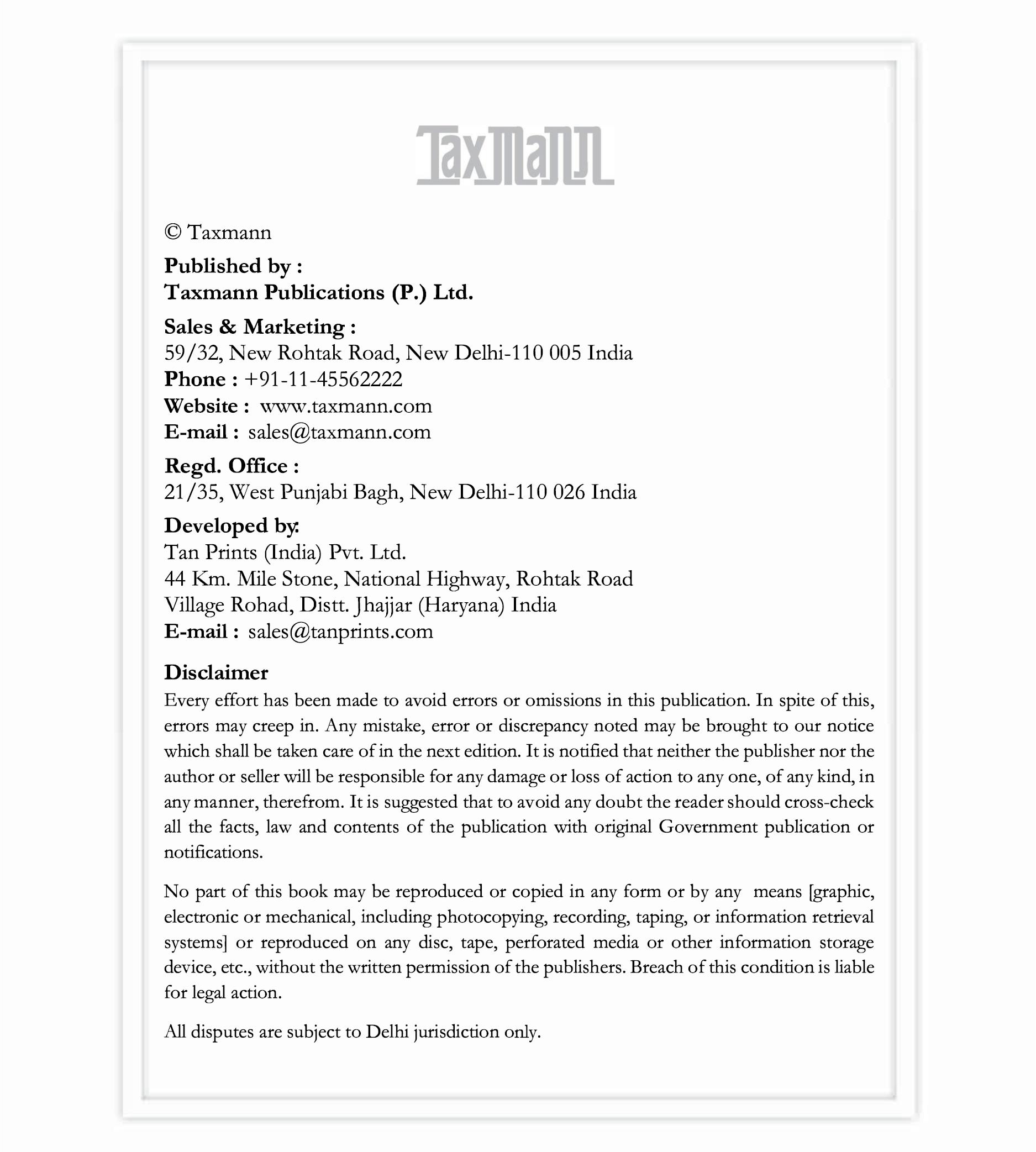












Industrial peace and harmony are essential to any nation’s economic and social progress. However, differences between employers and employees are inevitable in an industrial setup, often leading to disputes over wages, working conditions, employment security or management decisions. When such disputes escalate without resolution, they may culminate in strikes or lockouts. Both strikes and lockouts are integral components of the collective bargaining process, serving as pressure tools in industrial negotiations. While a strike reflects the workers’ expression of protest or demand, a lockout symbolises the employers’ countermeasure to ensure operational discipline. In India, the right to strike is not a fundamental right, but a statutory right, subject to legal restrictions under labour legislation. Similarly, lockouts are lawful only when they are conducted in compliance with specific legal procedures. Historically, these aspects were governed by the Industrial Disputes Act, 1947, which laid the foundation for industrial relations in post-independence India. However, with the evolution and diversification of industrial activities, the need for a more unified, integrated and simplified legal structure has become evident. This led to the enactment of the Industrial Relations Code, 2020, one of four labour codes introduced by the Government of India to consolidate, modernise and rationalise existing labour laws.
The Industrial Relations Code 2020, represents a significant reform in India’s labour law landscape. It consolidates and replaces three key statutes:
(a) The Industrial Disputes Act 1947 – This Act was intended to provide workers with a mechanism that would provide relief against layoffs, downsizing and wrongful termination that is against the letter of the law. It also sought to promote healthy labour relations by minimising the scope for illegal strikes and lockouts and penalising unfair labour practices.
(b) The Trade Unions Act 1926 – This Act aimed to provide workers with better working conditions, better wages, protection against abusive employment, the right to form an association and collective negotiation. It facilitated the organisation of the workers’ union and allowed greater participation of the workforce in the management of the establishment.
(c) Industrial Employment (Standing Orders) Act 1946 – This Act regulates the conditions of employment, grievances, misconduct, etc. of the workers employed in the industry.
It is to be noted that the Industrial Relations Code, 2020, was passed by Parliament and received the President’s assent on September 28, 2020. The Code has now come into
force with effect from November 21, 2025, following the issuance of the notification by the Central Government in the Official Gazette. Accordingly, the provisions of the Code have become operational from this date, replacing the earlier labour laws that were previously in effect.
The key provisions relating to strikes and lockouts are detailed under Sections 62 to 67 of the Industrial Relations Code 2020.
Strikes and lockouts are defined as follows:
(a) ‘Strike’ [Section 2(zk)] – Means a cessation of work by a body of persons employed in any industry acting in combination, or a concerted refusal, or a refusal, under a common understanding, of any number of persons who are or have been so employed to continue to work or to accept employment and includes the concerted casual leave on a given day by 50% or more workers employed in an industry.
(b) ‘Lockout’ [Section 2(u)] – Refers to the temporary closing of a place of employment, or the suspension of work, or the refusal by an employer to continue to employ any number of persons employed by him.
3.1.1.
The Supreme Court in T.K. Rangarajan v. Government of Tamil Nadu and others [2003] taxmann.com 3831(SC) held that the right to strike is not a fundamental right. In fact, there is no legal/statutory right to go on strike. Apart from statutory rights, Government employees cannot claim that they can take society to ransom by going on strike. Further, there is a prohibition on going on strike under the Tamil Nadu Government Servants Conduct Rules 1973.
Additionally, the Supreme Court in Crompton Greaves Ltd. v. Workmen (AIR 1978 SC 1489) observed that a strike is a legal weapon available to workers. However, its justification depends on the facts and circumstances of each case. The Court clarified that even an illegal strike may be justified in rare situations, while a legal strike may still be unjustified if the conduct of workers is unreasonable.
3.2.2.
The Supreme Court in Management of Express Newspapers Ltd. v. Workers & Staff Employed Under it (AIR 1963 SC 569) clarified that a lockout is not the same as a closure. A lockout refers to the temporary closing of the place of employment, the suspension of
work, or the employer’s refusal to employ workers during an industrial dispute. A closure, on the other hand, refers to the permanent shutdown of business operations. Unlike a lockout, a closure signifies the end of business itself, not just the temporary suspension of operations.
Further, in Management of Kairbetta Estate v. Rajamanickam (AIR 1960 SC 893), the Supreme Court elaborated on the distinction between a lockout and a layoff. The Court held that a layoff arises when ongoing operations exist but workers cannot be given work due to reasons beyond the employer’s control, while a lockout involves a temporary suspension of operations by the employer. In this case, a justified lockout in response to workers’ violence cannot be treated as a layoff, and thus, the workers were not entitled to layoff compensation.
The provisions relating to the prohibition on strikes and lockouts are as follows:
3.2.1
No person employed in an industrial establishment must go on strike, in breach of contract, in any of the following circumstances:
(a) Without giving the employer a notice of strike within 60 days before striking, or
(b) Within 14 days of giving such notice or
(c) Before the expiry of the date of the strike specified in such notice or
(d) During the pendency of any conciliation proceedings before a Conciliation Officer and seven days after the conclusion of such proceedings, or
(e) During the pendency of proceedings before a Tribunal or National Industrial Tribunal and sixty days after the conclusion of such proceedings, or
(f) During the pendency of arbitration proceedings before an arbitrator and 60 days after the conclusion of such proceedings, or
(g) During any period in which a settlement or award is in operation, in respect of matters covered by such settlement or award.
No employer of an industrial establishment must lock out any of his workers in any of the following circumstances:
(a) Without giving a notice of lockout within 60 days before locking out or
(b) Within 14 days of giving such notice or
(c) Before the expiry of the date of the lockout specified in such notice or
(d) During the pendency of any conciliation proceedings before a Conciliation
Officer and seven days after the conclusion of such proceedings, or
(e) During the pendency of proceedings before a Tribunal or National Industrial Tribunal and sixty days after the conclusion of such proceedings, or
(f) During the pendency of arbitration proceedings before an arbitrator and 60 days after the conclusion of such proceedings, or
(g) During any period in which a settlement or award is in operation, in respect of matters covered by such settlement or award.
The notice of strike or lockout must not be necessary where a strike or lockout is already in existence. However, the employer must send intimation of such lockout or strike on the day on which it is declared to such authority as may be specified by the appropriate Government, either generally or for a particular area or for a particular class of services.
If on any day, an employer receives from any person employed by him, any notice or gives to any person employed by him, any notice of strike or lockout, he must report it within 5 days to the appropriate Government or to such authority as the Government may prescribe and to the conciliation officer, specifying the number of notices received or issued on that day.
A strike or lockout must be considered illegal if it is commenced or declared in contravention of Section 62 or continued in violation of an order made under Section 42(7) of the Code.
3.5.1.
If a strike or lockout relating to an industrial dispute has already commenced and is in existence at the time an application is filed before the Tribunal or when the dispute is referred to an arbitrator or the National Industrial Tribunal, its continuance shall not be deemed illegal. The only condition is that the strike or lockout was legal when it began and has not been prohibited.
A lockout declared in consequence of an illegal strike or a strike declared in consequence of an illegal lockout must not be considered illegal.
A person is prohibited from knowingly spending or using money to directly support or promote any illegal strike or lockout.
The extant provisions are as follows:
4.1 Definitions
Strikes and lockouts are defined as follows:
(a) ‘Strike’ [Section 2(q)] - Means a cessation of work by a body of persons employed in any industry acting in combination, or a concerted refusal, or a refusal, under a common understanding, of any number of persons who are or have been so employed to continue to work or to accept employment.
(b) ‘Lockout’ [Section 2(l)] – A lockout refers to the temporary closing of a place of employment or the suspension of work or the refusal by an employer to continue to employ any number of persons employed by him.
(c) ‘Industrial Dispute’ [Section 2(k)] – Means any dispute or difference between employers and employers or between employers and workmen or between workmen and workmen, which is connected with the employment or non-employment or the terms of employment or with the conditions of labour of any person.
The provisions relating to strikes and lockouts as per the Industrial Dispute Act, 1947, are as follows:
4.2.1 Prohibition on Strikes
No person employed in a public utility service must go on strike in breach of contract, in the following circumstances:
(a) Without giving the employer a notice of strike within six weeks before striking, or
(b) Within 14 days of giving such notice or
(c) Before the expiry of the date of the strike specified in such notice or
(d) During the pendency of any conciliation proceedings before a Conciliation Officer and seven days after the conclusion of such proceedings, or
4.2.2 Prohibition on Lockouts
No employer carrying on any public utility service must lock out any of his workers in any of the following circumstances:
(a) Without giving a notice of lockout within six weeks before locking out or
(b) Within 14 days of giving such notice or
(c) Before the expiry of the date of the lockout specified in such notice or
(d) During the pendency of any conciliation proceedings before a Conciliation Officer and seven days after the conclusion of such proceedings.
The Supreme Court, in B.R. Singh v. Union of India (1990 AIR 1), emphasised that while workers have a right to collectively voice their grievances, this right must be exercised strictly in accordance with statutory requirements, including notice and other provisions of the Act. Any strike or lockout that violates mandatory legal conditions cannot be regarded as legal.
4.2.3. Prohibition on Strikes and Lockouts (Other Than Non-Public Utility Services)
No workman who is employed in any industrial establishment must go on strike in breach of contract, and no employer must declare a lockout:
(a) During the pendency of conciliation proceedings before a Board and seven days after the conclusion of such proceedings;
(b) During the pendency of proceedings before a Labour Court, Tribunal or National Tribunal and two months after the conclusion of such proceedings;
(c) During the pendency of arbitration proceedings before an arbitrator and two months after the conclusion of such proceedings;
(d) During any period in which a settlement or award is in operation with respect to matters covered by the settlement or award.
The notice of strike or lockout must not be necessary where a strike or lockout is already in existence. However, the employer must send intimation of such lockout or strike on the day on which it is declared to such authority as may be specified by the appropriate Government, either generally or for a particular area or for a particular class of services.
If on any day, an employer receives from any person employed by him, any notice or gives to any person employed by him, any notice of strike or lockout, he must report it within 5 days to the appropriate Government or to such authority as the Government may prescribe and to the conciliation officer, specifying the number of notices received or issued on that day.
A strike or lockout must be considered illegal if it is commenced or declared in contravention of Section 22 or 23 of the Act.
If a strike or lockout relating to an industrial dispute has already commenced and is in existence at the time of reference of the dispute to the Board, a labour Court, Tribunal or National Tribunal, its continuance shall not be deemed illegal. The only condition is that the strike or lockout was legal when it began and has not been prohibited.
4.5.2 Legality of Strikes or Lockouts Declared in Consequence of Illegality
A lockout declared in consequence of an illegal strike or a strike declared in consequence of an illegal lockout must not be considered illegal.
Whether a Lockout Declared in Consequence of an Illegal Strike Is Automatically Illegal?
The Supreme Court in Indian Iron & Steel Co. Ltd. & Another v. Their Workmen (1958 AIR 130, 1958 SCR 667), noted that a lockout was declared in consequence of repeated illegal strikes by the workmen. The Supreme Court held that the lockout was lawful and that the lockout notice, stating that employees’ services “shall be deemed to be discharged,” meant a temporary refusal to employ, not a permanent dismissal. The intention was not termination, but rather the suspension of services due to work disruption. Workers who reported within an extended period retained the right to resume work unconditionally. Further, the Court emphasised that Industrial Tribunals have limited scope to interfere in disciplinary actions and may intervene only where the action is malafide, constitutes unfair labour practice, violates principles of natural justice or is based on findings not supported by material.
A comparative overview is as follows: S. No. Key Changes Industrial Disputes Act, 1947 Industrial Relations Code, 2020 Impact
1. Definitions
2. Notice Period for Strike/Lockout
Section 2(q) defines the term ‘Strike’ and Section 2(l) defines the term ‘Lockout’
Section 22(1) –Six weeks’ notice required; strike not to commence within 14 days of giving notice
Section 22(2) –Similar provisions for lockouts
Section 2(zk) defines the term ‘Strike’ and Section 2(u) defines the term ‘Lockout’
Section 62(1) & (2) – Notice period extended to 60 days before strike/lockout; cannot commence within 14 days of notice
The Code broadens the concept of strike to cover mass casual leave movements often used to circumvent legal restrictions on strikes.
The extension from 6 weeks to 60 days provides a longer window for conciliation and negotiation, allowing parties and authorities to intervene before a shutdown occurs.
3. Restrictions during proceedings
Section 23 – Prohibition during pendency of conciliation, arbitration or tribunal proceedings and for 2 months thereafter.
4. Exemption from notice
5. Reporting obligation to the Government
Section 22(3) - Notice is not required if a strike/lockout already exists; the employer must intimate the Government Authority.
Section 22(6) –Employer must report notice of strike/lockout within 5 days to the appropriate Government.
Section 62(d) –(f) – Prohibition continues during pendency and extends for 60 days after conclusion of proceedings.
Section 63(2) –Similar provision retained; intimation on the day of declaration to the prescribed authority.
Section 62(6) – Employer must report notice of strike/lockout within 5 days to the appropriate Government and the conciliation officer.
The Code maintains the spirit of the Industrial Dispute Act but standardises the post-proceeding restriction to 60 days across forums.
6. Illegality of Strikes/ Lockouts
Section 24 – A strike or lockout is illegal if commenced in contravention of Section 22 or 23 of the Act or continued despite prohibition orders.
Section 63 – Similar provision; declares a strike/lockout illegal if commenced in violation of Section 62 or continued in contravention of orders under Section 42(7).
The code clarifies the timing and responsibility of intimation, making it obligatory for employers to report on the day of declaration.
7. When the continuation of a strike/lockout is not deemed illegal
Section 24(2) –Continuation of strike/lockout is not deemed illegal if strike/lockout was legal at the time of commencement and the dispute can later be referred for adjudication.
Section 63(2) – Similar safeguard retained.
The change broadens the reporting requirement by mandating employers to submit the notice of strike/ lockout not only to the appropriate Government but also to the conciliation officer. This enhances transparency and strengthens early dispute-resolution mechanisms.
The concept of illegality is retained, but references are streamlined to the new Code framework. The clear cross-linking with Section 42(7) strengthens enforceability by aligning illegality with formal adjudication prohibitions, thereby ensuring that industrial actions cannot continue once legally restrained.
The preservation of this clause upholds the balance between statutory regulation and the legitimate right to collective bargaining. It ensures that workers and employers are not penalised for lawful actions that precede a reference to adjudication, thereby maintaining fairness in procedural application.
8. Legality of consequent strikes/lockouts
Section 24(3) – A strike/lockout declared in consequence of an illegal strike or lockout is not considered illegal.
9. Financial support for illegal strikes/lockouts
Section 63(3) – Mirrors this position in the Code.
10. Penalties
Section 25 - No person must knowingly spend or apply any money in direct furtherance or support of any illegal strike or lockout.
Sections 26-28 – Provided monetary fines and imprisonment for illegal strikes, lockouts and instigation.
Section 64 – No person must knowingly spend or apply any money in direct furtherance or support of any illegal strike or lockout.
Sections 86-89 –Updated penalty structure with higher fines and graded severity.
The continuation of this principle maintains parity in employer-employee rights. It prevents one party from gaining an undue advantage through an initial illegal action and ensures equitable treatment under industrial jurisprudence.
The provision under the Code retains the same prohibition as the Industrial Disputes Act, 1947, reflecting continuity in the law. This indicates that legislative intent remains unchanged, ensuring that no financial support is extended to illegal strikes or lockouts.
The updated penalty structure aligns with current economic realities and acts as a stronger deterrent. It also introduces proportionality – higher penalties for employers or unions depending on the gravity and repetition of offences, ensuring better compliance and enforcement efficiency.
The legal framework governing strikes and lockouts in India aims to balance industrial peace with the genuine rights of workers and employers. The Industrial Relations Code, 2020, is expected to modernize and streamline the law by broadening key definitions, standardizing timelines, strengthening reporting requirements and updating penalties to discourage abrupt shutdowns and encourage negotiations. At the same time, it preserves protections for lawful ongoing strikes and lockouts, ensuring fairness to both parties. Overall, the Code seeks to promote stable and cooperative industrial relations by providing clear procedural mechanisms and discouraging illegal actions.





Founded 1972


Evolution From a small family business to a leading technology-oriented Publishing/Product company


Expansion

Launch of Taxmann Advisory for personalized consulting solutions

Aim
Achieve perfection, skill, and accuracy in all endeavour

Growth
Evolution into a company with strong independent divisions: Research & Editorial, Production, Sales & Marketing, and Technology

Future
Continuously providing practical solutions through Taxmann Advisory
Editorial and Research Division
Over 200 motivated legal professionals (Lawyers, Chartered Accountants, Company Secretaries)
Monitoring and processing developments in judicial, administrative, and legislative fields with unparalleled skill and accuracy
Helping businesses navigate complex tax and regulatory requirements with ease

Over 60 years of domain knowledge and trust
Technology-driven solutions for modern challenges
Ensuring perfection, skill, and accuracy in every solution provided
Income Tax
Corporate Tax Advisory
Trusts & NGO Consultancy
TDS Advisory
Global Mobility Services
Personal Taxation
Training
Due Diligence
Due Dilligence
Advisory Services
Assistance in compounding of offences
Transactions Services
Investment outside India
Goods
Transaction Advisory
Business Restructuring
Classification
Due Diligence
Training
Advisory
Trade Facilitation Measures
Corporate
Corporate Structuring
VAT Advisory
Residential Status

Naveen Wadhwa Research and Advisory [Corporate and Personal Tax]
Chartered Accountant (All India 24th Rank)
14+ years of experience in Income tax and International Tax
Expertise across real estate, technology, publication, education, hospitality, and manufacturing sectors
Contributor to renowned media outlets on tax issues

Vinod K. Singhania
Expert on Panel | Research and Advisory (Direct Tax)
Over 35 years of experience in tax laws
PhD in Corporate Economics and Legislation
Author and resource person in 800+ seminars

V.S. Datey
Expert on Panel | Research and Advisory [Indirect Tax]
Holds 30+ years of experience
Engaged in consulting and training professionals on Indirect Taxation
A regular speaker at various industry forums, associations and industry workshops
Author of various books on Indirect Taxation used by professionals and Department officials

S.S. Gupta
Expert on Panel | Research and Advisory [Indirect Tax]
Chartered Accountant and Cost & Works Accountant
34+ Years of Experience in Indirect Taxation
Bestowed with numerous prestigious scholarships and prizes
Author of the book GST – How to Meet Your Obligations', which is widely referred to by Trade and Industry

Manoj Fogla
Expert on Panel | Research and Advisory [Charitable Trusts and NGOs]
Over three decades of practising experience on tax, legal and regulatory aspects of NPOs and Charitable Institutions
Law practitioner, a fellow member of the Institute of Chartered Accountants of India and also holds a Master's degree in Philosophy
PhD from Utkal University, Doctoral Research on Social Accountability Standards for NPOs
Author of several best-selling books for professionals, including the recent one titled 'Trust and NGO's Ready Reckoner' by Taxmann
Drafted publications for The Institute of Chartered Accountants of India, New Delhi, such as FAQs on GST for NPOs & FAQs on FCRA for NPOs.
Has been a faculty and resource person at various national and international forums

the UAE
Chartered Accountant (All India 36th Rank)
Has previously worked with the KPMG

Taxmann Delhi
59/32, New Rohtak Road
New Delhi – 110005 | India
Phone | 011 45562222
Email | sales@taxmann.com
Taxmann Mumbai
35, Bodke Building, Ground Floor, M.G. Road, Mulund (West), Opp. Mulund Railway Station Mumbai – 400080 | Maharashtra | India
Phone | +91 93222 47686
Email | sales.mumbai@taxmann.com
Taxmann Pune
Office No. 14, First Floor, Prestige Point, 283 Shukrwar Peth, Bajirao Road, Opp. Chinchechi Talim, Pune – 411002 | Maharashtra | India
Phone | +91 98224 11811
Email | sales.pune@taxmann.com
Taxmann Ahmedabad
7, Abhinav Arcade, Ground Floor, Pritam Nagar Paldi
Ahmedabad – 380007 | Gujarat | India
Phone: +91 99099 84900
Email: sales.ahmedabad@taxmann.com
Taxmann Hyderabad
4-1-369 Indralok Commercial Complex Shop No. 15/1 – Ground Floor, Reddy Hostel Lane Abids Hyderabad – 500001 | Telangana | India
Phone | +91 93910 41461
Email | sales.hyderabad@taxmann.com
Taxmann Chennai No. 26, 2, Rajan St, Rama Kamath Puram, T. Nagar
Chennai – 600017 | Tamil Nadu | India
Phone | +91 89390 09948
Email | sales.chennai@taxmann.com
www.taxmann.com
Taxmann Bengaluru
12/1, Nirmal Nivas, Ground Floor, 4th Cross, Gandhi Nagar
Bengaluru – 560009 | Karnataka | India
Phone | +91 99869 50066
Email | sales.bengaluru@taxmann.com
Taxmann Kolkata Nigam Centre, 155-Lenin Sarani, Wellington, 2nd Floor, Room No. 213
Kolkata – 700013 | West Bengal | India
Phone | +91 98300 71313
Email | sales.kolkata@taxmann.com
Taxmann Lucknow
House No. LIG – 4/40, Sector – H, Jankipuram Lucknow – 226021 | Uttar Pradesh | India
Phone | +91 97924 23987
Email | sales.lucknow@taxmann.com
Taxmann Bhubaneswar
Plot No. 591, Nayapalli, Near Damayanti Apartments
Bhubaneswar – 751012 | Odisha | India
Phone | +91 99370 71353
Email | sales.bhubaneswar@taxmann.com
Taxmann Guwahati
House No. 2, Samnaay Path, Sawauchi Dakshin Gaon Road
Guwahati – 781040 | Assam | India
Phone | +91 70866 24504
Email | sales.guwahati@taxmann.com